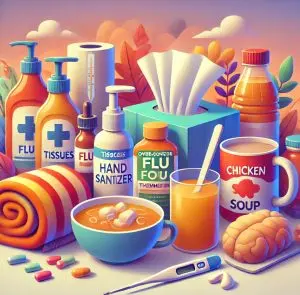Influenza is an acute respiratory infection caused by the influenza virus, particularly prevalent during the winter and early spring. For children, flu symptoms can be severe, and parents need to understand how to respond effectively. This article provides guidance on what to do and what to avoid when dealing with the flu to help children cope better.
Common Symptoms of the Flu
The flu typically presents with symptoms such as high fever, cough, sore throat, muscle aches, headaches, and fatigue. Some children may also experience vomiting and diarrhea. When a child exhibits these symptoms, parents should take appropriate action promptly.
What to Do When the Flu Strikes
1. Seek Medical Attention Promptly
If your child has a high fever (over 38°C or 100.4°F), severe cough, difficulty breathing, or persistent diarrhea, seek medical help as soon as possible. Doctors can assess the child's condition through physical examinations and necessary tests to determine if the flu virus is present and may prescribe antiviral medications such as oseltamivir (Tamiflu) to alleviate symptoms and shorten the duration of the illness.
2.Ensure Adequate Hydration
Fever can lead to dehydration, making it crucial to keep your child well-hydrated. Encourage them to drink warm water, juice, or electrolyte solutions to replenish lost fluids and prevent dehydration. This is especially important for infants, as dehydration can lead to more severe health problems.
3.Promote Rest
The body requires a lot of energy to fight off the virus, so ensure your child gets enough rest and sleep. Allow them to rest in bed and avoid excessive activity to aid recovery.
4.Do Not Rely Solely on Home Remedies
While home remedies can help ease symptoms, flu viruses require professional medical intervention for treatment. Do not solely depend on self-treatment, especially when your child exhibits severe symptoms.
5.Avoid Forcing Food Intake
If your child lacks appetite while sick, do not force them to eat. You can encourage them to stay hydrated, and gradually reintroduce regular food as they regain their appetite.
Preventive Measures for the Flu
In addition to taking appropriate measures when the flu strikes, preventing the flu is also essential. Here are some effective preventive methods:
1.Get the Flu Vaccine
Parents should ensure their children receive the flu vaccine every autumn. While the vaccine may not provide 100% protection, it significantly reduces the chances of infection and the severity of symptoms.
2.Maintain Good Hygiene Practices
Teach children to wash their hands frequently, especially after being in public places, which can effectively reduce the spread of viruses. Additionally, encourage children to cover their mouths and noses when coughing or sneezing.
3.Boost Immunity
Ensure your child has a balanced diet, adequate sleep, and regular physical activity to strengthen their immune system and enhance their ability to resist viral infections.
Conclusion
Proper responses by parents during a flu outbreak can help children recover more quickly. Timely medical attention, maintaining hydration, and ensuring adequate rest are crucial. At the same time, avoiding certain inappropriate actions can reduce the risk of exacerbating the illness. By prioritizing children's health, parents can help ensure that their kids navigate flu season safely.
References
- Centers for Disease Control and Prevention. (2023). Flu Information for Parents.
- Mayo Clinic. (2023). Flu (Influenza) in Children.
- American Academy of Pediatrics. (2023). Influenza.
- WebMD. (2023). Flu Symptoms in Children.
- HealthyChildren.org. (2023). Influenza: What Parents Need to Know.
- KidsHealth. (2023). Flu in Children: Symptoms and Treatment.
- National Institute of Allergy and Infectious Diseases. (2023). Influenza Overview.
- Stanford Children's Health. (2023). Flu and Your Child: What to Know.













